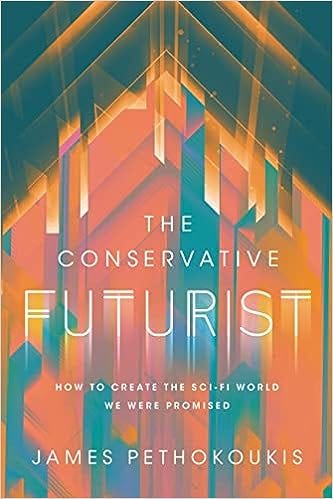🏭 Do you want to build a factory?
Environmental regulations make it harder than it should be, even for the clean energy sector
Quote of the Issue
“We will be the future of clean energy. We will be the future of clean energy. Well, ladies and gentlemen, welcome to the future. This is what the future looks like for our green energy economy and how we're going to protect this fragile planet that's been entrusted to us for the time that we live on this planet.” - New York Governor Kathy Hochul at the Port of Albany, January 14, 2022
Some self promotion: I have a book coming out on October 3. (Next Tuesday!) The Conservative Futurist: How To Create the Sci-Fi World We Were Promised is currently available for pre-order pretty much everywhere. Some folks are already saying nice things about it:
Anyway, I’m very excited about it! Let’s gooooo! 🆙↗⤴📈
The Essay
🏭 Do you want to build a factory?
I work at a think tank that codes “center-right,” I guess, and the name of my forthcoming book is the “Conservative Futurist.” Given those realities, I understand how some folks might reflexively dismiss my frequent criticism of the past half-century of environmental regulation as totally unsurprising, same old-same old, free-marketeer fundamentalism or moldy “neoliberalism.”
I mean, I get it. I really do. But what do the people who have that knee-jerk response make of this story of the stalled construction of a planned wind tower factory at the Port of Albany in New York state? Here’s the current state of play from Politico’s E&E News:
At the Port of Albany, little work has been done on a factory where 550 workers are supposed to roll thick plates of steel into massive turbine towers — the backbones of new offshore wind projects planned for the East Coast. Trees have been cleared for the facility, but almost three years after the factory was announced, construction on its five buildings has yet to begin. And the cost of the project has more than doubled from $350 million to $700 million.
The factory’s developers insist the project will move forward, even if it won’t be done in time to serve what was supposed to be its first customer: a wind project planned off Long Island that is scheduled to begin construction as early as this year. Even so, the developers concede they have yet to figure out how to pay for the additional expenses. “It is a big amount of money,” said Patrick Pellerin, president of Marmen, a Quebec-based manufacturer and one of the three companies involved in the Albany factory. “We have been trying to solve that issue for quite some time.”
To be fair, the problem at the Port of Albany seems to be multicausal. For example: There’s a supply-chain issue that seems to stem primarily from overburdened European factories and disruptions caused by Russia's invasion of Ukraine. Ukraine supplied nearly half of the EU's steel plate, a key material for wind turbine towers. But Ukraine's production plunged 70 percent after Russia attacked steel mills in Mariupol. This global supply crunch has sent costs for US offshore wind projects skyrocketing as developers struggle to obtain turbine parts years in advance. “Even getting a slot, getting a commitment to have turbines ready by a certain date, that’s a huge issue,” according to one industry executive quoted in the piece.
Reading the piece, I expected to see strained supply chains mentioned as a problem, if only because of expanding global demand for renewable energy generation. And, unfortunately, I was also correct in expecting something like this:
Progress has proceeded in fits and starts. Tree clearing prompted objections from some neighbors. A group of residents filed a lawsuit claiming the port had not adequately notified the public of its plans. It was later dismissed. While the project eventually succeeded in obtaining all the necessary environmental permits, costs have soared.
Ah yes, “citizen voice” in action once again, as it has been since the National Environmental Policy Act took effect in 1970.
Keep reading with a 7-day free trial
Subscribe to Faster, Please! to keep reading this post and get 7 days of free access to the full post archives.




